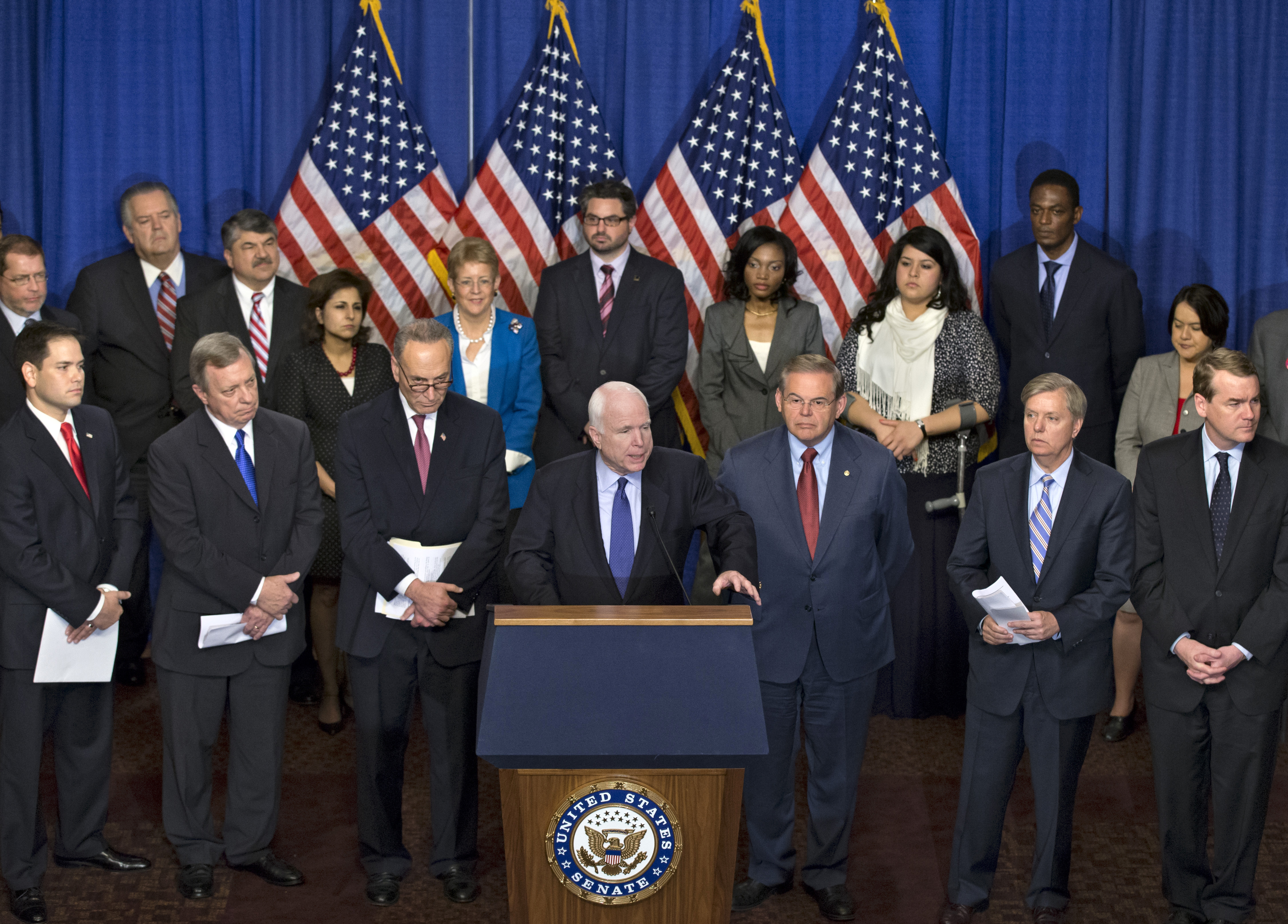WASHINGTON (AP) — House Republicans will take on the immigration issue in bite-size pieces, shunning pressure to act quickly and rejecting the comprehensive approach embraced in the Senate, a key committee chairman said Thursday.
Videos by Rare
House Judiciary Committee Chairman Bob Goodlatte, R-Va., declined to commit to finishing immigration legislation this year, as President Barack Obama and a bipartisan group in the Senate want to do. He said bills on an agriculture worker program and workplace enforcement would come first, and he said there’d been no decision on how to deal with legalization or a possible path to citizenship for the estimated 11 million immigrants living here illegally, a centerpiece of a new bipartisan bill in the Senate.
“It is not whether you do it fast or slow, it is that you get it right that’s most important,” Goodlatte said at a press conference to announce the way forward on immigration in the House.
He said that while he hopes to be able to produce a bill this year, “I’m going to be very cautious about setting any kind of arbitrary limits on when this has to be done.”
The approach Goodlatte sketched out was not a surprise, but it was a sign of the obstacles ahead of congressional passage of the kind of far-reaching immigration legislation sought by Obama and introduced last week in the Senate by four Republican and four Democratic lawmakers. Many in the conservative-led House don’t have the appetite for a single, big bill on immigration, especially not one that contains a path to citizenship, still viewed by some as amnesty. Instead they prefer to coalesce around consensus issues like border security, temporary workers and workplace enforcement.
But if the Senate’s comprehensive approach faces obstacles in the House, the House’s piecemeal approach won’t fly in the Senate.
Two of the lead authors of the Senate bill, Sens. Chuck Schumer, D-N.Y., and John McCain, R-Ariz., rejected the piece-by-piece approach at a breakfast meeting with reporters Thursday hosted by the Christian Science Monitor. Schumer and McCain said that any time an immigration issue is advanced individually, even something widely supported like visas for high-tech workers or a citizenship path for those brought as children, lawmakers and interest groups start pushing for other issues to get dealt with at the same time.
“What we have found is, ironically, it may be a little counterintuitive, that the best way to pass immigration legislation is actually a comprehensive bill, because that can achieve more balance and everybody can get much but not all of what they want,” Schumer said. “And so I think the idea of doing separate bills is just not going to work. It’s not worked in the past, and it’s not going to work in the future.”
The House has always loomed as the toughest barrier to passage of immigration legislation, partly because many rank-and-file House Republicans don’t feel a political imperative to act. Some GOP House members, such as Wisconsin’s Paul Ryan have been speaking out in favor of a comprehensive solution to immigration. But unlike in the Senate, where a number of Republicans have begun to embrace far-reaching immigration legislation as a necessary remedy for a Republican Party that has struggled to maintain support from Hispanic voters, many Republican House members represent districts where Latino voters aren’t a significant factor.
Supporters of immigration legislation believe that the best way to pressure the House to act would be for the Senate to pass immigration legislation with a convincing majority including a large number of Republican supporters. Schumer and McCain predicted just that outcome Thursday, saying they hoped for support from a majority of Republican senators in addition to a majority of Democrats.
“I think it’s very doable,” McCain said.
Senate Judiciary Committee Chairman Patrick Leahy, D-Vt., said Thursday that in the wake of three days of hearings on the Senate immigration bill, his committee will begin to amend and vote on the legislation May 9. Action on the Senate floor may come in June. The bill would secure the border, usher in new work visa programs for high- and low-skilled workers, require employers to verify workers’ legal status and put immigrants living here illegally on a 13-year path to citizenship.
Despite Goodlatte’s preference for breaking immigration up into multiple bills, a bipartisan group in the House, operating separately from Goodlatte’s committee, has been working behind the scenes on a sweeping bill expected to be similar to what the Senate is considering. Goodlatte said he will be interested to see what that group produces but hasn’t determined how his committee might approach it. He also said that while he’s decided to begin with hearings on individual bills, there’s been no decision on how to approach voting on any legislation or when to hold a vote.
And whatever Goodlatte’s committee does, final decisions on the approach in the House will be made by Speaker John Boehner, R-Ohio, who’s avoided taking any public stance so far on how to move forward. Boehner issued a brief statement through a spokesman Thursday commending both Goodlatte and the bipartisan House working group on immigration “for their continuing work on this complex and important issue.”
Associated Press writers Alan Fram and Luis Alonso Lugo contributed to this report.
Follow Erica Werner on Twitter: https://twitter.com/ericawerner
Copyright 2013 The Associated Press.


